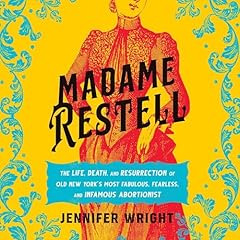
Get Well Soon
History's Worst Plagues and the Heroes Who Fought Them
Failed to add items
Add to Cart failed.
Add to Wish List failed.
Remove from wishlist failed.
Adding to library failed
Follow podcast failed
Unfollow podcast failed
 Prime members: New to Audible?
Prime members: New to Audible?Get 2 free audiobooks during trial.
Buy for $18.18
-
Narrated by:
-
Gabra Zackman
-
By:
-
Jennifer Wright
A witty, irreverent tour of history's worst plagues - from the Antonine Plague, to leprosy, to polio - and a celebration of the heroes who fought them.
In 1518, in a small town in Alsace, Frau Troffea began dancing and didn't stop. She danced until she was carried away six days later, and soon 34 more villagers joined her. Then more. In a month more than 400 people had been stricken by the mysterious dancing plague. In late-19th-century England an eccentric gentleman founded the No Nose Club in his gracious townhome - a social club for those who had lost their noses, and other body parts, to the plague of syphilis for which there was then no cure. And in turn-of-the-century New York, an Irish cook caused two lethal outbreaks of typhoid fever, a case that transformed her into the notorious Typhoid Mary.
Throughout time, humans have been terrified and fascinated by the diseases history and circumstance have dropped on them. Some of their responses to those outbreaks are almost too strange to believe in hindsight. Get Well Soon delivers the gruesome, morbid details of some of the worst plagues we've suffered as a species, as well as stories of the heroic figures who selflessly fought to ease the suffering of their fellow man. With her signature mix of in-depth research and storytelling, and not a little dark humor, Jennifer Wright explores history's most gripping and deadly outbreaks, and ultimately looks at the surprising ways they've shaped history and humanity for almost as long as anyone can remember.
©2017 Jennifer Wright (P)2017 Blackstone Audio, Inc.Listeners also enjoyed...




















Editorial reviews
Editors Select, February 2017 - This book was a major unexpected delight for me. I've always been intrigued by plagues but usually just in the realm of sci-fi. I wasn't sure if a nonfiction book on the subject could really hook me. However, in Get Well Soon, author Jennifer Wright presents a whimsical, fascinating, and often hilarious exploration of an otherwise grim topic. Combining history, sociology, and science, she traces some of the most horrific plagues in human history from their origins to their eventual cures. Throughout each narrative, Wright peppers in fun facts - such as the belief that filling your house with onions could stave off the plague - while paying full respect to the victims of these illnesses. Gabra Zackman gives a downright masterful performance, perfectly delivering both the somber facts and wry humor. If you're a fan of Mary Roach or, like me, have even just a passing interest in the topic, don't hesitate to give this one a try. Sam, Audible Editor

Editor's Pick
Sparing no gory details
"Listen, I can’t sugarcoat it: the state of surgery in the early 19th century was not pretty, so this listen is not for the squeamish. But if, like me, you have an appetite for cool macabre history, and you're looking for a great nonfiction book to send chills down your spine this October, give this one a try. Ralph Lister sets the perfect dramatic tone for this story—and he (fun fact) happens to count Joseph Lister among his ancestors!"
—Sam D., Audible Editor
People who viewed this also viewed...


















It is really well written, witty, relevant, and we'll researched.
The narrator is clear, has a good command of the humor, and a good reading pace.
I absolutely recommend it!!!
Witty an Smart
Something went wrong. Please try again in a few minutes.
bookgirl
Something went wrong. Please try again in a few minutes.
Would you recommend this audiobook to a friend? If so, why?
I had a lot of fun with this book. There wasn't a lot of new information in the book for me, as I enjoy a lot of nonfiction of this type, but it was written in such a way that I thought about things I already knew in a new way.What other book might you compare Get Well Soon to and why?
If you can imagine a Bill Bryson history written by Tina Fey that is what this felt like to me. There were moments that made me laugh out loud, and moments that made me think. I liked the narrator, listening to her was like having a conversation with a snarky friend.Like a fun conversation with a snarky friend
Something went wrong. Please try again in a few minutes.
You do not need to be a member of Mensa to understand this book that is for sure. A great listen and Gabra Zackman gives a great performance.
Highly recommended.
Who knew that leprosy could be so much fun!
Something went wrong. Please try again in a few minutes.
Interesting for sure!
Something went wrong. Please try again in a few minutes.


